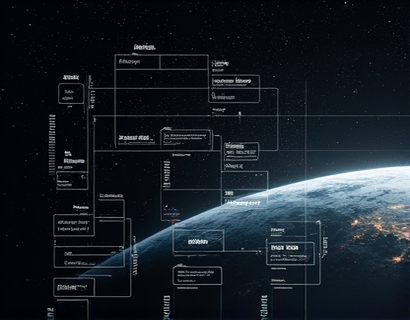Decentralized DAO Management: Maximizing Efficiency and Transparency with Advanced Analytics Software
In the rapidly evolving landscape of decentralized finance and governance, Decentralized Autonomous Organizations (DAOs) have emerged as a transformative force. These organizations leverage blockchain technology to enable community-driven decision-making and autonomous operations. However, managing a DAO effectively requires robust tools and strategies to ensure efficiency, transparency, and informed governance. Advanced analytics software plays a pivotal role in this context, offering DAO managers and administrators the means to streamline governance, enhance collaboration, and drive sustainable growth. This article delves into the critical aspects of deploying advanced analytics software to optimize DAO management, focusing on how such tools can transform governance and foster data-driven decision-making.
Understanding DAO Governance Challenges
DAOs operate on a unique model where decisions are made collectively by token holders, often through on-chain voting mechanisms. While this model promotes decentralization and community involvement, it also introduces several governance challenges. One of the primary issues is the complexity of managing large volumes of data and ensuring that all stakeholders have access to the information they need to make informed decisions. Additionally, the transparency required in DAO operations must be balanced with the need for secure and efficient decision-making processes. Traditional methods of governance often fall short in these areas, leading to inefficiencies and potential conflicts.
Role of Advanced Analytics Software in DAO Management
Advanced analytics software is designed to address these challenges by providing comprehensive tools for data management, analysis, and visualization. These platforms offer DAO managers the ability to collect, process, and interpret vast amounts of data in real-time, enabling more informed and timely decision-making. The key benefits of integrating advanced analytics software into DAO management include enhanced transparency, improved collaboration, and data-driven governance.
Enhancing Transparency
Transparency is a cornerstone of DAO governance, and advanced analytics software plays a crucial role in maintaining this principle. By centralizing data from various sources, such as transaction logs, voting records, and community feedback, analytics platforms provide a single, accessible point of truth. This centralized data repository ensures that all stakeholders have equal access to the information needed to understand the DAO's operations and performance. For instance, real-time dashboards can display key metrics such as token distribution, voting outcomes, and project progress, allowing members to stay informed and engaged.
Moreover, advanced analytics tools can generate detailed reports and audits, which are essential for maintaining trust and accountability. These reports can be automatically generated and shared with the community, reducing the risk of information asymmetry and potential disputes. The transparency provided by these tools helps build a strong, trust-based community, which is vital for the long-term success of a DAO.
Improving Collaboration
Collaboration is another critical aspect of DAO management, and advanced analytics software facilitates this by streamlining communication and coordination among members. Through integrated collaboration features, such as discussion forums, task management, and project tracking, these platforms enable seamless interaction and cooperation. Members can easily propose ideas, discuss proposals, and collaborate on projects, all within a structured and transparent environment.
Furthermore, analytics software can enhance collaboration by providing insights into community dynamics and engagement levels. By analyzing participation patterns and feedback, DAO managers can identify areas where collaboration can be improved and take proactive steps to foster a more active and engaged community. For example, identifying inactive members and understanding their reasons for disengagement can help tailor initiatives to re-engage them, thereby strengthening the overall community.
Data-Driven Governance
One of the most significant advantages of advanced analytics software in DAO management is its ability to support data-driven governance. By leveraging sophisticated analytical tools, DAO managers can transform raw data into actionable insights, enabling more strategic and effective decision-making. These insights can inform a wide range of governance activities, from setting strategic priorities to allocating resources and evaluating performance.
For instance, predictive analytics can help forecast the outcomes of proposed changes or initiatives, allowing the community to make more informed votes. Machine learning algorithms can identify trends and patterns in data, providing early warnings for potential issues or opportunities. This proactive approach to governance ensures that decisions are based on solid evidence rather than assumptions or anecdotal evidence.
Additionally, advanced analytics can facilitate the implementation of smart governance rules and automated workflows. By defining clear criteria and thresholds, these rules can trigger specific actions or alerts, ensuring that the DAO operates efficiently and consistently. For example, an automated system can monitor token holdings and trigger a rebalancing process when certain thresholds are met, maintaining the desired distribution and preventing concentration of power.
Case Studies and Real-World Applications
Several DAOs have successfully implemented advanced analytics software to enhance their governance and operations. One notable example is a decentralized investment fund that uses analytics tools to monitor portfolio performance, track market trends, and assess risk. By integrating real-time data from various financial sources, the fund's managers can make swift and informed decisions, optimizing returns for token holders. The transparency provided by the analytics platform also builds trust among investors, who can track the fund's performance and strategy in real-time.
Another example is a community-driven open-source project that utilizes analytics software to manage contributions and governance. The platform tracks code contributions, issue reports, and community feedback, providing a comprehensive overview of the project's progress. This data-driven approach has led to more efficient issue resolution, higher contributor engagement, and a more cohesive community. The project's success demonstrates the practical benefits of advanced analytics in fostering collaboration and transparency.
Challenges and Considerations
While the benefits of advanced analytics software in DAO management are clear, there are several challenges and considerations that must be addressed. First, the adoption of such tools requires a certain level of technical expertise, which may be a barrier for some DAOs. To overcome this, it is essential to provide user-friendly interfaces and comprehensive training resources. Additionally, ensuring the security and privacy of sensitive data is paramount. Implementing robust security measures and adhering to best practices in data management can help mitigate these risks.
Another consideration is the cost of implementing and maintaining advanced analytics platforms. While the long-term benefits can outweigh the initial investment, it is crucial to conduct a cost-benefit analysis to ensure that the chosen solution aligns with the DAO's financial capabilities. Open-source or cloud-based solutions can be more accessible and cost-effective for smaller or resource-constrained DAOs.
Future Trends and Innovations
The field of DAO management and analytics is rapidly evolving, with ongoing innovations poised to further enhance efficiency and transparency. One emerging trend is the integration of artificial intelligence (AI) and machine learning (ML) to provide more advanced predictive analytics and automated decision-making. AI can analyze complex data sets to identify subtle patterns and insights that may not be apparent through traditional methods, enabling more proactive and strategic governance.
Another area of innovation is the development of interoperable analytics platforms that can seamlessly integrate with various blockchain ecosystems and DAO protocols. This interoperability will facilitate the creation of more comprehensive and unified governance tools, allowing DAOs to leverage data from multiple sources and ecosystems. As the technology matures, we can expect to see more sophisticated and user-friendly solutions that further democratize access to advanced analytics in DAO management.
Conclusion
In conclusion, advanced analytics software is a transformative tool for DAO management, offering significant benefits in terms of efficiency, transparency, and data-driven governance. By addressing the challenges of data management and collaboration, these platforms enable DAOs to operate more effectively and make informed decisions. As the technology continues to evolve, the potential for enhancing DAO governance and driving sustainable growth is immense. Embracing advanced analytics is not just an option but a necessity for modern DAOs aiming to thrive in the decentralized ecosystem.










































